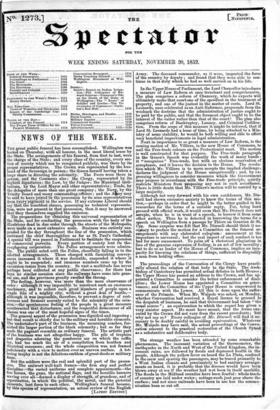In the Upper House of Parliament, the Lord Chancellor introduces
a measure of Law Reform at once trenchant and comprehensive. The plan comprises a reform of Chancery, which he expects will ultimately make that court one of the speediest in the treatment of property, and one of the justest in the matter of costs. Lord St. Leonards, once celebrated as an Anti-Reformer, propounds from the woelsack the doctrine that the administration of justice ought to be paid by the public, and that the foremost object ought to be the interest of the suitor rather than that of the court! The plan also comprises reform of Bankruptcy, Lunacy, and Criminal Codifica- tion. Front the scope of this measure it might be inferred, that if Lord St. Leonards had a lease of time, by being attached to a Min- istry of some stability, he would be both willing and able to effect very beneficial improvements in legal administration. Next in importance to so great a measure of Law Reform, is the coming motion of Mr. Villiers, in the new House of Commons, to nail the Free-trade colours on the Protectionist mast. The motion is well constructed for that purpose. The Free-trade paragraph in the Queen's Speech was evidently the work of many hands : it " recognizes " Free-trade, but with an obvious reservation of acceptance, and it leaves the decision to the House. The resolu- tion which Mr. Villiers is to move accepts the implied challenge; declares the judgment of the House unequivocally ; and, by ex- pressing willingness to consider measures which the Government .may 'propose in accordance with the Free-trade principle, quietly restricts Ministers from proposing any not in such accordance. There is little doubt that Mr. Villiers's motion will be carried by a large majority. Although not very forward with his own confidences, Mr. Dis- raeli had shown excessive anxiety to know the terms of this mo- tion,—perhaps in order that he might be the better guided in his researches for the terms of a suitable reply. For, being hard pressed with official work, it would seem that Mr. Disraeli does not sample, when he is in want of a speech, to borrow it from some other author. Thus he is detected in borrowing the terms for a speech on Wellington from a passage by Thiers on Gouvion de St. Cyr. Some surprise was felt that Mr. Disraeli should think it ne- cessary to preface the motion for a Committee on the funeral ar- rangements with any elaborated eulogium : amusement at the imposture is universal ; but the real import of such conduct is too bad for mere amusement. To palm off a rhetorical plagiarism in lieu of the genuine expression of feeling, is an act of low morality ; but to do so as leader of the House of Commons, implies an inca- pacity for knowing the relations of things, sufficient to disqualify a man from holding office.


























